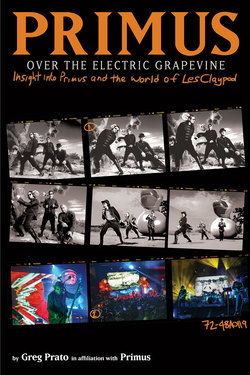Читать книгу Primus, Over the Electric Grapevine - Primus - Страница 6
На сайте Литреса книга снята с продажи.
ОглавлениеFOREWORD
To think back a long way, I suppose it was the album Sailing the Seas of Cheese. I must have been thirteen or fourteen years old. That was the time when I started to get really interested in music—rock music and guitar-based music. It was around about that time that I first joined a band in high school, a band called Gothic Plague, that featured the drummer Dominic Howard, who I’m in the band Muse with now. Gothic Plague would do cover songs of various indie music from the UK and also grunge music. The bass player we had at the time couldn’t face Primus. [Laughs] Because the bass lines were so complex. But myself and Dom in particular, I felt like we were both moving toward more interesting, great instrumentalists and great musicians, rather than some of the stuff the band was listening to at the time. And Primus was one of those groups.
I remember Sailing the Seas of Cheese was the first record I ever listened to where the musicianship really shone through in a way that didn’t seem just purely chuffiness. It had loads of originality, and it was my first exposure to real experimental harmony usage. It blew us away. It was one of the groups that definitely led to us—myself and Dom—knowing that what we wanted to do was a little bit different to what the other two guys were doing in the band. And eventually that band broke up.
It was just myself and Dom, so I was playing the guitar and Dom was on drums. For a year there, we were a bit like the White Stripes—just guitar and drums. But we were always drawn to the idea of trying to find a bass player who we felt was up to the kind of standard that we believed we were. [Laughs] At the time, we were becoming more interested in progressive rock music—groups like Pink Floyd, Rush, Primus, and stuff like that. And really drawn toward instrumental music. Also, film music was always a big influence, like Ennio Morricone, and even Hans Zimmer—just this more left-field approach to prioritizing instrumentation in music and complex arrangements, over the standard sort of songwriting approach that everybody seems to take.
At the time, our two favorite bass players were Les Claypool and Flea from the Chili Peppers, and being where we were from in Southwest England, I think that was probably quite unusual for us to be into that music—from such a faraway place from where we were raised. Especially since it was radically different from the music that was popular in the UK at the time, which was very much Britpop, like Oasis and Blur. Talking about groups like Oasis, the level of instrumentation in these groups we always found to be very uninspiring. So we were always drawn to these more impressive, clearly higher level of musical intelligence that was coming out of groups like Primus and the Red Hot Chili Peppers.
So really, that was one of the defining things that got our band going, because the challenge was to find a bass player, and we couldn’t find one. We eventually came across Chris [Wolstenholme], who is our current bass player. He was the only guy we met who could play with his fingers and he was interested in playing slap bass, and seemed to be on the same page. His playing was really great from a young age and he’s gone on to become one of the best bass players around. I think the influence is quite strong in that area, because our band, when we first formed, from the ages of about fifteen to eighteen or nineteen, we were very much orientated in the more progressive sound—much more instrumental-based.
And the other reason for that was because I didn’t value myself as a singer at that time. I definitely mainly wanted to be a guitar player, and the original idea was to find a singer for the band, but again, because we came from a small town in a rural area, we could never find one. So really, that was another reason why we leaned toward bands like Pink Floyd and Primus, where the emphasis is not so much on the voice—it’s more on the instruments and the arrangements. And that’s how the band Muse really started. It wasn’t until I was eighteen or nineteen that I started to sing, and my voice—even though I didn’t think it was that good—it seemed to lead to a kind of songwriting, and that was when we started to veer more toward the songwriting approach and when I became more confident as a singer.
And Primus was very influential in the formation of Muse and what our priorities were.
Matthew Bellamy
Muse
